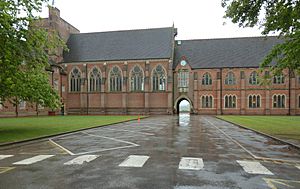Victor Silvester facts for kids
Victor Marlborough Silvester (born February 25, 1900 – died August 14, 1978) was a famous English dancer, writer, musician, and bandleader. He played a huge part in making ballroom dance popular in the first half of the 1900s. His music records were incredibly successful, selling 75 million copies from the 1930s to the 1980s.
Contents
Early Life and War Service
Victor Silvester was born in Wembley, England. His father was a vicar. Victor went to schools like Ardingly College and St. John's School, Leatherhead, but he often left without permission.
During the First World War, Victor joined the British Army in 1916. He was only 16, but he told them he was 20. After a week, he was discharged because he was too young. However, he quickly joined the First Aid Services, like the Red Cross. He worked as a stretcher-bearer in France and Italy, helping wounded soldiers. In 1917, he was hurt in the leg by a shell explosion while helping others. He refused treatment until all the other wounded soldiers were taken care of. Because of his bravery, he received the Italian Bronze Medal of Military Valour.
After the war, he studied at Oxford University for a year. He also studied music at Trinity College, London, as he had taken piano lessons when he was younger.
Becoming a Dance Champion
Victor soon became very interested in dancing. He was one of the first English dancers after the war to use a full "natural turn" in the slow waltz. This new move helped him win the first ever World Ballroom Dancing Championship in 1922 with his dance partner, Phyllis Clarke. He married Dorothy Newton just a few days later.
In 1927, Victor helped create the rules for Ballroom Dance, which is now known as the International Style. He also wrote a book called Modern Ballroom Dancing. This book became a best-seller and is still printed today!
He opened a dance academy in London, which grew into 23 different dance studios. Many famous people learned to dance from him, including the actress Merle Oberon. Victor even had his own TV show on the BBC in the 1950s, called BBC Dancing Club. He later became the President of the Imperial Society of Teachers of Dancing, a very important dance organization.
Music Career and Strict Tempo
Victor felt there weren't enough good records for dancing, so in 1935, he started his own five-piece band. It later became known as Victor Silvester and his Ballroom Orchestra. Their first song, "You're Dancing on My Heart," sold 17,000 copies and became his signature tune.
Victor insisted that his music followed a "strict tempo." This meant the songs had the exact number of beats per minute recommended by the ISTD for ballroom dances. He became famous for the phrase "slow, slow, quick-quick-slow," which is a rhythm used in dances like the foxtrot and quickstep.
His band had a special sound. It included a lead solo violin, an alto saxophone, and two pianos. One piano played the main tune, and the other played a light, tinkling background sound that Victor called his "lemonade." The band's drummer, Ben Edwards, was very important for keeping the strict tempo for over 40 years. Unlike most bands of that time, Victor Silvester's orchestra usually did not have singers. Victor, who was a violinist himself, would stand in front of the orchestra and conduct.
He continued making music for 50 years. His orchestra mostly played popular songs and show tunes. Later, his son, Victor Silvester Jr., took over the orchestra and even played some rock and roll and disco music. However, it's the melodic recordings from the 1940s and 1950s that are most remembered today.
Other Dance Bands
Because Victor Silvester's records sold so well, other dancers started their own strict-tempo bands. Dancers like Henry Jacques and Josephine Bradley also created music for ballroom dancing. Joe Loss was another very popular bandleader who played music for ballroom competitions for a long time. Other bands that played for ballroom dancing included Oscar Rabin and Phil Tate. For Latin dances, Edmundo Ros was especially famous.
Later Years and Legacy
By 1958, Victor Silvester was the most successful dance band leader in British music history. He was a big star on British radio and television. His BBC Television show Dancing Club ran for 17 years! He also had a weekly radio show on the BBC World Service that lasted from 1948 to 1975. People all over the world listened to his music.
In 1961, Victor Silvester was given the OBE award, which is a special honor in the UK. He passed away in France at the age of 78. His orchestra continued under his son's direction until the 1990s.
Victor Silvester's personal items, including his OBE medal, his First World War medals, and his music archives, are now held in a private collection.
 | Emma Amos |
 | Edward Mitchell Bannister |
 | Larry D. Alexander |
 | Ernie Barnes |


